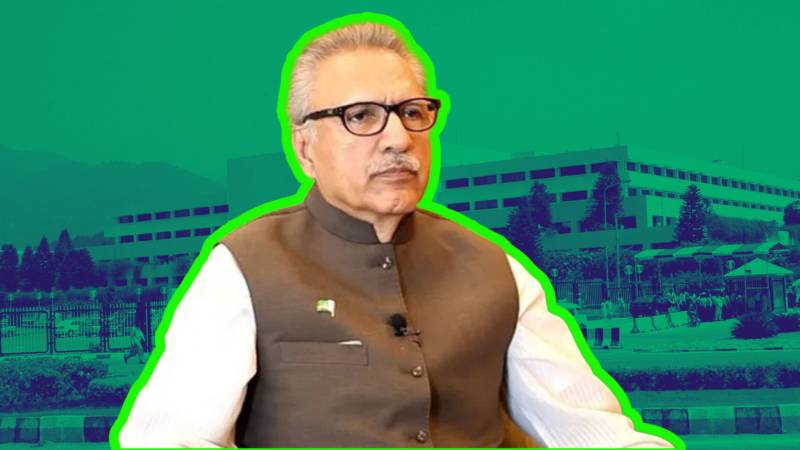
With the national and all four assemblies now dissolved and the caretaker setup in the driving seat, thoughts have turned to President Arif Alvi and whether his term will see an extension as appears probably for the interim setup or will he exit from stage left upon the set date.
More importantly, there are concerns over what would happen to the bills that lie pending on his table.
President Dr Arif Alvi's term as the 13th president of Pakistan is due to end on September 9, 2023.
The problem is that since all four provincial assemblies are currently dissolved along with the national assembly, no electoral college exists to elect a new president.
This has sparked a legal debate on President Arif Alvi's place in the system after his tenure ends.
Will Alvi get an 'extension'?
Talking to The Friday Times, seasoned legal expert Ahmed Awais suggested that President Arif Alvi will see his tenure 'extend' and that he will continue as the country's President beyond the natural end of his tenure.
Citing Article 44 of the Constitution, he said President Alvi shall continue in his office until a new president is elected and assumes office.
He explained that the election of a new President was only possible after the completion of the electoral college comprising the Senate, the National Assembly and all the provincial assemblies.
"The electoral college, at present, is incomplete because the national assembly and provincial assemblies do not exist; therefore, a new president cannot be elected," Awais said.
Former Election Commission of Pakistan (ECP) secretary and currently an advisor to the Punjab Chief Minister on Law and Parliamentary Affairs, Kanwar Dilshad, echoed the sentiments of Awais and pointed to Article 44 as well.
Dilshad said that elections for the President will take place once the electoral college is complete.
Article 44 (1) of the Constitution states that the President shall continue to hold office even after his term expires until a new president is elected and assumes office.
It is believed that electing a new president would be among the first actions a newly elected assembly would undertake after electing a leader of the house, speaker and deputy speaker.
Purgatory of returned bills
Before it was dissolved three days too early, the 15th National Assembly led by Shehbaz Sharif had passed a flurry of controversial bills in its farewell session.
In fact, the last ten days of the assembly saw more legislative activity than the previous half of the year, including a two day period where a record 54 bills were passed, ignoring several parliamentary traditions.
All of these bills, having sailed through the upper house of Parliament, were forwarded to the President for securing a stroke of his pen to turn them into law.
In such a hazy scenario, over a dozen bills have yet to become acts of Parliament for want of the President's consent.
Though the President has approved some of the bills, many laws have been thrown into a sort of limbo after he returned them to non-existent assemblies. As a result, many bills have now lapsed or will lapse soon.
There will be no movement on the bills until a new assembly is elected in the country to review them, rectify the issues pointed out and secure approval afresh.
Some bills now languishing in purgatory include the Code of Criminal Procedure amendment bill seeking to enhance punishment for those disrespecting the Holy Prophet (PBUH), his companions and other religious figures.
The other returned bills include the Press, Newspapers, News Agencies and Books Registration Amendment bill; Imports and Exports (Control) (Amendment) Bill 2023. The Public Sector Commission Amendment Bill, Pakistan Institute of Management Sciences Bill, Horizon University bill, Federal Urdu University amendment bill, NFC Institute, Multan amendment bill and National Institute for Technology bill and others are also in purgatory.
Since July 1, Parliament has introduced and approved around a hundred bills.
The passed bills include:
The HEC (Amendment) Bill, 2023; Official Secrets (Amendment) Bill 2023, grants sweeping authority to intelligence agencies and the FIA, allowing them to conduct raids and detain citizens suspected of breaking the law.
Other bills include the National Anti-Money Laundering and Counter Financing of Terrorism Authority in Pakistan; The Toshakhana (Management and Regulation) Bill, 2023; Federal Urdu University of Acts, Sciences and Technology, Islamabad (Amendment) Bill, 2023; The Pakistan Ruet-e-Hilal Bill, 2023; Gas (Theft Control and Recovery) (Amendment) bill, 2023; National Logistics Corporation Act, 2023; The Press Council of Pakistan (Amendment) Bill, 2023; and others.

